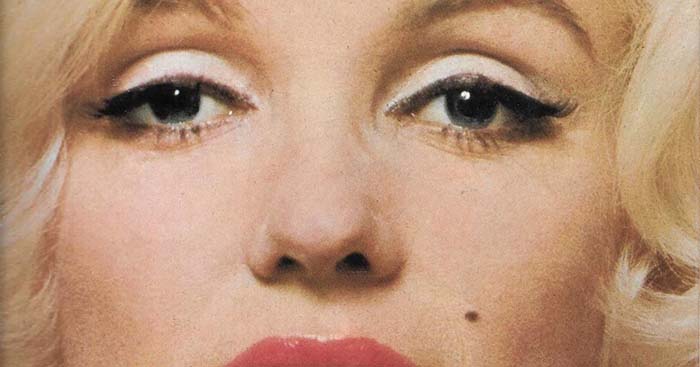Most new readers of this magazine stumble upon it in a search for interesting factoids. But you may be disappointed to find out that that it contains a relative few. And proudly so. While Irregardless Magazine is certainly filled with trivial little trifles to tickle your curiosity, a factoid is a very different thing.
Norman Mailer’s ‘Factoids’
Though speakers often use it to mean ‘a true but insignificant statement’, factoid, in fact, means almost the exact opposite. In his 1973 biography of Marylin Monroe, Norman Mailer makes the claim that an actor and public figure like Marilyn Monroe cannot help but find herself living in the in-between world of not-quite-fact and not-quite-fiction.
Since the psychological heft of a role has more existential presence than daily life…so the twilight between reality and fantasy is obliged to become more predominant for a great actor than for others. 1
Mailer continues to wax poetic on the nature of truth, all in service of excusing his poorly researched biography, which this book certainly is. Marilyn: A Biography rambles along like a book report written by an arrogant high schooler who never read the book. But in its pages, Mailer stumbles his way into linguistic history by coining a very popular word.
In the opening pages of Marylin, Mailer calls Maurice Zolotow’s earlier biography “a book which has fewer facts than factoids”. And he later goes on to define factoids as “facts which have no existence before appearing in a magazine or newspaper, creations which are not so much lies as a product to manipulate emotion in the Silent Majority.”
The Etymology of ‘Factoid’
This original definition of the word factoid makes sense etymologically speaking. The suffix -oid means ‘like, resembling, having the quality of’. And this is where we get words like android (‘man-like or resembling man’) and asteroid (‘star-like’). So if you take fact—meaning ‘the truth’—and add -oid to the end you get factoid, —or ‘like or resembling the truth’.
Norman Mailer was very particular about this word’s usage though. To him, a factoid was not just ‘a fiction’ or ‘a legend’.
A factoid is a fact which has no existence on earth other than what’s appeared in the newspaper and then gets repeated forever after. So people walk around as if it is the blooming lively fact. 2
A factoid is, very precisely, ‘a fact that has no veracity other than that it has appeared in print’. It’s a spontaneous fabrication believed by the public because, ‘why would they lie?’ This makes it very similar to bullshit. But not quite.
A New Definition
It’s not clear when exactly the alternate definition of factoid came into use. By 1996, The American Heritage Book of English Usage listed a new definition for the word.
Factoid has since developed a second meaning, that of a brief, somewhat interesting fact, that might better have been called a factette. The panel has less enthusiasm for this usage, however, perhaps because they see it as confusing. 3
At the time, 73% of The American Heritage Dictionary‘s Usage Panel accepted the original definition. Yet 43% accepted the new definition with the majority saying, why not just say fact?
Blurring the Line between ‘Fact’ and ‘Factoid’
Mailer’s coinage quickly gained popularity, being the most interesting thing in his mediocre biography. But its usage slowly shifted on American tongues. Early uses of factoid focus on ‘statements sold as facts but later proven to be lies’. But the use of factoid shifted over the decades. In the mid-80s to 90s, writers begin using factoid to describe ‘a statement that is vague enough to be true or untrue’ without making clear which.
It’s easy to see how this sense of the word evolved into its current use of ‘a brief, insignificant fact’. I’ve heard that the human body replaces itself every 7 years. But is this a factoid in its original sense or a factoid in its new sense? Who knows? Who cares. It sounds good.
The earliest use of factoid’s alternate definition I could find was in a 1992 headline from Adweek stating, “A visit to skin central; a factoid-spouting Joan Lunden gives Intensive Care a makeover”. 4 The New York Times quickly followed with statements like, “Yesterday’s factoid of interest is that Leyritz does have a team-leading .711 slugging percentage”,5 among others.
An Alternative to ‘Factoids’
Though I try to avoid prescriptivism as much as possible, I must say I miss the original definition of factoid. It could be quite useful in a world where dictionaries name post-truth word of the year 6 and ‘fake news’ enters the world lexicon. Though the irony that factoid has become synonymous with fact is quite poetic.
If you want an alternative to factoid’s secondary definition, try swapping out -oid for a diminutive like with factlet or factette as mention above. Diminutives like -let and –ette help bring fact closer to the desired meaning of ‘brief’ or ‘insignificant’.
Though even if the American Heritage Dictionary does suggests factette, be careful with it. 19th century manufactures have used -ette to mean ‘imitation’ or ‘sort of’. Consider the textiles flannelette, leatherette and linenette—none of which are actually flannel, leather or linen. 7 Oh, well. There’s no winning is there?
- Mailer, Norman | Marylin: A Biography | 1973
- Bragg, Melvyn | “Norman Mailer Talks to Melvyn Bragg about the Bizarre Business of Writing a Hypothetical Life of Marilyn Monroe” |The Listener | 20 Dec 1973
- Berube, Margery (editor) | “Word Choice“| The American Heritage Book of English Usage | 1996
- Lippert, Barbara | “A visit to skin central; a factoid-spouting Joan Lunden gives Intensive Care a makeover” | Adweek | 6 Jan 1992
- Araton, Harvey | “Pleasant Surprise for Leyritz and Yanks” | The New York Times | 8 Jun 1992
- Flood, Alison | “‘Post-truth’ named word of the year by Oxford Dictionaries” | The Guardian | 15 Nov 2016
- “-ette” | Online Etymology Dictionary

